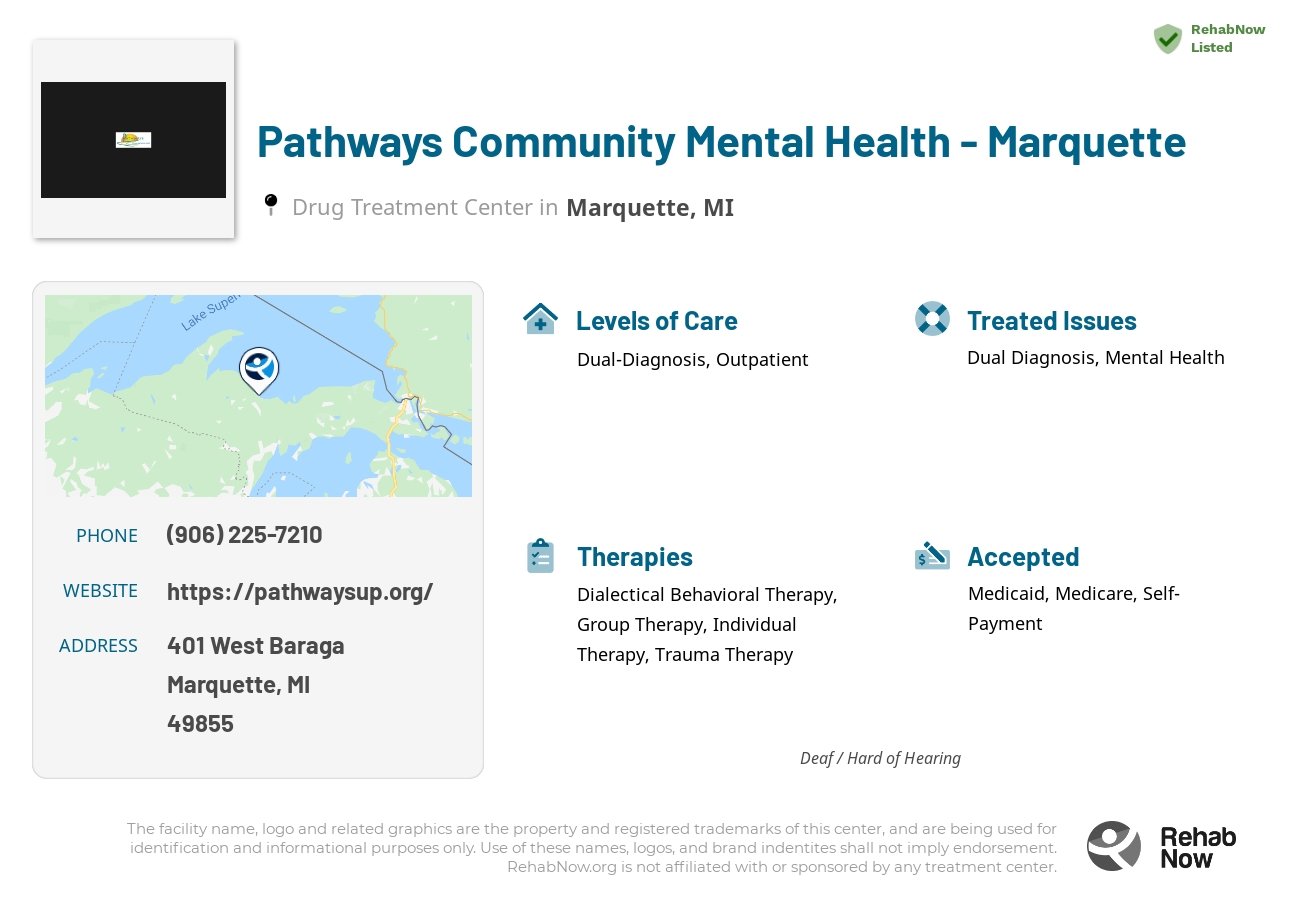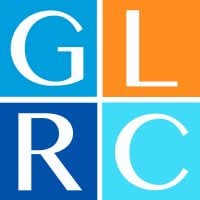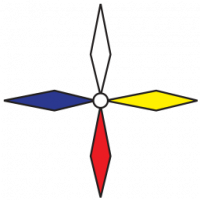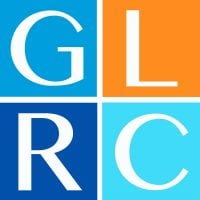Pathways Community Mental Health - Marquette
Drug Rehab Center in Marquette, Michigan
Pathways Community Mental Health - Marquette in Marquette, Michigan is a community-based mental health facility providing a range of services, including counseling, therapy, psychiatry appointments, and crisis services, to help individuals, couples, and families in the greater Marquette region with mental health challenges and substance addiction.
About Pathways Community Mental Health - Marquette in Michigan
Pathways Community Mental Health – Adult in Marquette, Michigan, stands as a distinguished facility concentrating on dual diagnosis and mental health issues. Its dedicated approach towards serving individuals with severe mental illness, emotional disturbances, or developmental disabilities aims to significantly enhance their life quality. Unique in its mission, the center offers specialized outpatient care that is both comprehensive and tailored to address each individual's needs.
Accredited by CARF, Pathways Community Mental Health – Adult ensures high standards of care and treatment efficacy. The center's affiliation with the national Pathways organization underscores its commitment to excellence and evidenced-based practices in mental health and dual diagnosis treatment.
- Specialized Dual Diagnosis Treatment: Focuses on treating individuals with co-occurring mental health issues and substance abuse, providing a holistic approach to recovery.
- Tailored Outpatient Programs: Offers outpatient services designed to meet the unique challenges and needs of each patient, promoting lasting sobriety and mental health stability.
- Accredited Care: Boasts CARF accreditation, affirming the center's dedication to maintaining the highest standards of service and client care.
Serving a wide array of individuals, Pathways Community Mental Health – Adult addresses a spectrum of addictions, including substance abuse and alcoholism, alongside mental health disorders. Treatment methods encompass counseling, group therapy, and various clinical interventions aimed at managing cravings, developing healthy coping mechanisms, and fostering productive lifestyles through outpatient levels of care.
Genders
Ages
Modality
Additional
Accreditations

CARF
The Commission on Accreditation of Rehabilitation Facilities (CARF) is a non-profit organization that specifically accredits rehab organizations. Founded in 1966, CARF's, mission is to help service providers like rehab facilities maintain high standards of care.
Conditions and Issues Treated
Dual diagnosis refers to someone who has both an addiction and a mental or emotional illness. Dual diagnosis treatment includes therapy for both issues simultaneously, allowing for effective treatment of either.
Sometimes people with addiction disorders also have co-occurring disorders like depression, anxiety, bipolar disorder, etc. These require specialized treatment programs that address both drug and alcohol addiction as well as psychiatric illnesses. Some rehabilitation facilities provide patients with co-occurring disorders a program with highly integrated services and a clean, distraction-free environment.
Levels of Care Offered
This center offers a variety of custom treatment tailored to individual recovery. Currently available are Dual-Diagnosis, Outpatient, with additional therapies available as listed below.
Alcohol or drug addiction, or co-occurring disorders, are treated in an outpatient program. The patient must attend therapy and other programs at the facility but can return home each night.
Outpatient treatment allows recovering addicts to live at home while receiving addiction treatment. Outpatients can attend group sessions for a few hours per week. Outpatients may also continue to work full time and study/attend school without interruption if they choose.
Therapies & Programs
Different people react differently to various treatment options. Some drug rehabilitation centers offer individualized treatment that caters to the specific needs of a drug addict. The best treatment option varies on an individual depending on the type of drug abused, life history, medical condition of the person, social circumstances, and the environment they live in now.
When a person enters drug rehab, they usually have anti-drug associations such as withdrawal symptoms, stress, cravings, etc. The first step of drug rehab is to detoxify the body from any residual substances in it. Drug rehabilitation centers usually employ trained medical professionals to help in this process. Usually, the initial detoxification lasts for five days, where the person is monitored under close supervision.
Attending group therapy at Pathways Community Mental Health - Marquette in , is a useful way for those seeking sobriety to realize they aren’t the only one going through it.
This is when a group of people on different recovery phases get together and talk about what they’re going through, their triggers, successes, and failures. This can include alternative types of therapies too! Group therapy may occur on an outpatient or inpatient basis with groups that have no pre-existing relationships outside the session, unlike support groups where everyone already knows each other beforehand.
Trauma therapy is a form of therapy used to help people process and understand past traumas. This can help struggling addicts, as many people turn to drugs or alcohol to mask the pain of their past. Trauma therapy can be done in several ways, such as through visualization, discussion, and writing down thoughts and feelings. The goal is to help the individual understand why they are having problems coping with certain situations and changing how they think and react to things. This is often done in tandem with other therapies to treat the underlying issues associated with addiction.
The idea behind trauma therapy is that while some people can experience traumatic events and not have lasting psychiatric symptoms, many others will. In these cases, memories get hidden from consciousness but continue to influence how the person processes and copes with things in their life. They may avoid situations that resemble what happened or become suddenly angry or irritated to a situation that reminds them of a past event. With the help of a therapist, people can go back over memories and experiences. This helps them understand why they are having problems coping with certain situations and changing how they think and react to things.
This type of cognitive-behavioral therapy helps people understand how their thoughts, behaviors, and feelings are interconnected. It can help patients with borderline personality disorder gain control over their actions and stop self-harming thoughts and attempts.
Cognitive Behavioral Therapy is a type of psychotherapy that helps people address the thoughts and behaviors that may have led to their addiction. It also helps change negative thoughts into positive ones and promotes healthy communication between addicts and those around them. CBT is an efficient treatment for individuals suffering from all sorts of addictions.
Cognitive Behavioral Therapy (CBT) focuses on the underlying thoughts and behaviors that caused the problem of addiction in the first place and may cause a relapse. Negative feelings are common in drug abuse disorders, but they can lead to co-occurring disorders if not recognized. CBT involves strategies that help to change the behavior pattern by restructuring negative thoughts into positive ones. It helps to remove these feelings, and it provides long-term benefits. Also, CBT promotes self-awareness, self-control and can be administered as a mono-therapy or as part of combination therapy.
Payment Options Accepted
For specific insurance or payment methods please contact us.
Pathways Community Mental Health Associated Centers
Discover treatment facilities under the same provider.
- Pathways Community Mental Health - Marquette in Marquette, MI
- Pathways Community Mental Health - Escanaba in Escanaba, MI
- Pathways Community Mental Health - Munising in Munising, MI
- Pathways Community Mental Health - Newberry in Newberry, MI
Learn More About Pathways Community Mental Health Centers
Additional Details
Specifics, location, and helpful extra information.
Marquette, Michigan 49855 Phone Number(906) 225-7210 Meta DetailsUpdated April 15, 2024
Staff Verified
Pathways Community Mental Health - Marquette Patient Reviews
There are no reviews yet. Be the first one to write one.
Marquette, Michigan Addiction Information
Michigan has the second-highest rate of drug and alcohol abuse in the nation. Heroin is linked to more than 50% of the state's hepatitis C cases. Marijuana is the drug most often associated with crimes in Michigan, followed by methamphetamines. Opioids alone are responsible for almost 20% of all drug overdose deaths in Michigan.
In Marquette, Michigan, drug addiction is a significant issue. There were 2,738 admissions for heroin addiction and 11,994 admissions for marijuana addiction in the city. It is important to have a strong support system to help you stay on the right path. Many local and nearby rehab centers can provide you with the support you need to get through this difficult time.
Treatment in Nearby Cities
- Ionia, MI (271.1 mi.)
- Northville, MI (343.7 mi.)
- Plainwell, MI (296.5 mi.)
- Bad Axe, MI (286.2 mi.)
- Holly, MI (318.8 mi.)
Centers near Pathways Community Mental Health - Marquette
The facility name, logo and brand are the property and registered trademarks of Pathways Community Mental Health - Marquette, and are being used for identification and informational purposes only. Use of these names, logos and brands shall not imply endorsement. RehabNow.org is not affiliated with or sponsored by Pathways Community Mental Health - Marquette.








